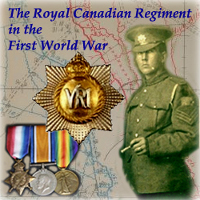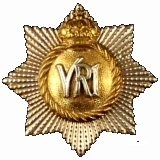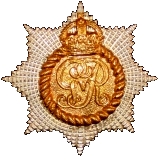
Recollections of a Nonagenarian
of Service in The Royal Canadian Regiment (1916-19)
Part 5
by Robert England, M.C.
POST-WAR REFLECTIONS ON THE PERMANENT FORCE IN THE C.E.F.
Very little recrimination or bitterness remained among those who served. I recall meeting Brig. General J. A. Clark, D.S.O., who commanded the 7th Brigade in this last action of Cambrai where the R.C.R. lost 37 killed, 53 missing and 204 wounded; it was in 1936 at a dinner table and he mentioned how uncomfortable it was for a new brigadier to ask so much from well-known regiments, to be under such pressure himself and scarcely more than a name to the brigade.
I first noticed Private Beaumont in my platoon in 1916 spreading a handkerchief to eat from his mess-tin, always rather cheerfully welcoming rum issue, inclined to mention names of abstainers releasing, as he seemed to imply, a more adequate supply.
Few regimental histories pay much attention to the grievances of combatant officers and men. But the literature of World War I has much to say about the resentment against staff and regulation and inequalities of status, comforts, promotion, and indeed, sacrifice.
The C.E.F. Battalion of The Royal Canadian Regiment did not escape this front-line syndrome. In my case severe wounding twice left me free of some of the disappointment of some temporary fellow officers with promotion; some of this failure was eventually partially dealt with when grievances were brought to the notice of the brigadier on the appeal of a new non-permanent force Lt. Col. in command of the Regiment.
Still, the Royal Canadian Regiment at Mons, ready to march to Germany, showed only one temporary in command of a company. Capt. C.G.B. Thompson, M.C. (39 months field service), and for a time of Lt. Col. in command of the Regiment. Capt. W.J. Home, M.C. (32 months field service), commissioned in the R.C.R. in December 1915, had "A" Company. Lieut. H.C. Barker, M.C. (29 months: wounded 9-4-17) was still a Lieut., and had a permanent force commission of 1916. No doubt the higher p.f. pay, the vicissitudes of staff postings, the pension complications for p.f., sudden vacancies occasioned by casualties demanding return of eligible p.f., and perhaps even a p.f. set of mind may have discouraged rapid promotion of temporaries. Though in the end, as professional soldiers, many p.f. officers must have completed their service in France with some degree of disappointment. It may be that the block in promotion was due to the late arrival of the R.C.R. in France, October 31, 1915, thus hardly seeing much action until 1916 when the general officer list was preponderantly made up of militia officers, reflecting the bias of the Minister of Militia, Hon. Sir Sam Hughes. Appointed Minister in 1911 he favoured the militia, deplored drinking in officers' messes, and Fetherstonhaugh (p. 193) records his attack on the Permanent Force at a dinner to General Sir Ian Hamilton, Inspector General of Overseas Forces of the British Army in Halifax on July 10, 1913. There are those who believed the Minister was not averse to a long stay by the Royal Canadian Regiment in Bermuda. He was a master of improvisation, and the pattern of local militia units gave his political talents full scope. He still used many professional soldiers, and though he failed in much, the sailing of the First Contingent was a triumph in a civilian-minded Canada. Through the years I have heard echoes of grievances shared, but promotion "beefs" really don't touch the other ranks. I was particularly delighted by the commissioning of men who had served with me in "C" Company or in Scouts and Bombers, such as Lieut. H. Brealey, M.M., Lieut. Barrett-Lennard, M.C., Lieut. J. W. Miller, M.M., Lieut. D. A. Porter, M.C., and a rather odd case, Lieut. Percy Beaumont. I first noticed Private Beaumont (South Africa ribbons) in my platoon in 1916 spreading a handkerchief to eat from his mess-tin, always rather cheerfully welcoming rum issue, inclined to mention names of abstainers releasing, as he seemed to imply, a more adequate supply. He had been a staff captain in the Boer War, a professional soldier but his drinking habits had brought about his dismissal. He was a competent brave soldier, spoke French and German, his wife was French of good family and the owner of property at Lens, and in 1917 when he saw the ruined coal-mines, he used to say that the Germans would have to pay for all the destruction caused. In 1918 he requalified at the Canadian Cadet School at Bexhill for a commission in the C.E.F., but he celebrated his regaining his status too well, failing to report for duty at Bramshott. While I was courts-martial officer at 17th Reserve, the Assistant Provost Marshal asked me if I knew him and told me he had gone to Liphook station to pick Beaumont up, but learned afterwards that the officer concerned had fallen asleep and arrived at Portsmouth. Within a few days Percy Beaumont was delivered to our orderly room at 17th Reserve by his long-suffering and splendid wife, and placed under arrest.
Now the ball was in Percy's court, and he played it with all the aplomb and assurance of an old regular. He chose his venue of trial—the Horse Guards in London. He listened to advice, and chose for his· lawyer an able 85th captain called Baker, a barrister. Percy was quite aware that old British Army regulars counted "cashiering" and such-like penalties with social ostracism—a verdict to be abhorred when a man had re-won his spurs on the battlefield of France after mis-fortunes; they were more likely to be tolerant than a Canadian court-martial, anxious to comply with the letter of King's Regulations and Orders and Military Law, and seeing little distinction between dismissal and cashiering. Percy was right—he was reprimanded and his sentence duly promulgated at the Horse Guards. Back Beaumont came to parade before Col. Muirhead at 17th Reserve, Bramshott, asking for his Sam Browne belt and to be returned to duty. The C.O. said that, as far as he knew, Beaumont was still under arrest. Percy explained that he had been reprimanded and his sentence promulgated at the Horse Guards, and he was ready for duty.
The C.O. said he had no advice, but would enquire. Percy then said, "May I have the privileges of the Mess, sir?" The C.O. said "I suppose so." So Percy for nearly a week had no duty and time to drink and relate how pleased old so and so, etc., of his early days in the British Army (now of senior rank on his court-martial) were to see him and to learn of his service with the Canadians.
In the Cambrai battle Percy Beaumont gave splendid service. I recall him whistling his men and yelling "Taxi," when I'd pointed out the map locations, heads bobbing up and down and men moving quickly under his shrewd assessment of terrain and enemy shelling incidents. Later in the attack, he retrieved a bottle of rum from Lt. Mills just killed saying to me "Mills followed that tank too closely, risky to get too close but I had to get this water-bottle!" He offered me a drink but I noticed the mud and gore and it was unappetizing.
In 1918 I saw Percy Beaumont at Ripon ready to be demobbed. One day I found him outside of his hut having a haemorrhage into a pail held by his batman and saw him off in an ambulance to the hospital. After a week I heard bad news about him and hastened to see him to say "Good-bye" before repatriation to Canada. I found him cheerful, he remarked that doctors gave him only 3 months to live and that he had had his bed moved so that he could see the legs of the WAACS going by. In 1923, when studying at the Sorbonne, I had occasion in Paris to go to Cook's for currency exchange and ran into Percy Beaumont, bowler-hatted and debonair, with a whiff of whiskey on his breath, ready for a party had I been willing—still in trouble with authorities, blasting British Embassy officials who had been enquiring about his movements and activities in the Saar where French Army was in occupation. "Look" Percy said "I'm a millionaire" and showed me German money then depreciating like an avalanche. I had seen Percy Beaumont, when wounded at Cambrai, being borne on a stretcher by German prisoners, smoking a cigarette, and certainly in command in German. I wondered what he had really been up to that made the Embassy people inquisitive. It was my last sight of this old regular (but most irregular) British Army officer, yet I can use such words as duty, cool courage, about a part of his life in the Royal Canadian Regiment in battle and on the march.
As a Regiment the band was always in the middle when on the march, so that the Scouts led and I as Scout Officer was on the right of the hollow square, the Bandmaster took his cue from me to "Form Fours," "Quick March." As we marched along the roads of France Col. Claude Hill would ride up, and enquire from me "Robert, where are we?" This is often my best memory, as I always knew.
Accounts, such as this, of forgotten dead, of long-lost valiant men, were crowned by Greek historians, with eloquent lapidary judgments about duty, death and destiny.
That would be too high a note for myoid comrades in that world of simple loyalties and military virtues-sufficient that I recall the cheerful heroism, the good nature, the gaiety of heart and tongue of men who endured professional infantry training and its sometimes dusty traditions to make smartness, rank and file and order, alignment, shining brass and bayonets, gleaming transport and groomed horses of the Royal Canadian Regiment on the march a Pro Patria symbol of a united Canada and a pledged loyalty to a Sovereign.
If Claude Hill now asked his old Scout Officer "Robert, where are we?" I now would not be sure.
- The O'Leary Collection; Medals of The Royal Canadian Regiment.
- Researching Canadian Soldiers of the First World War
- Researching The Royal Canadian Regiment
- The RCR in the First World War
- Badges of The RCR
- The Senior Subaltern
- The Minute Book (blog)
- Rogue Papers
- Tactical Primers
- The Regimental Library
- Battle Honours
- Perpetuation of the CEF
- A Miscellany
- Quotes
- The Frontenac Times
- Site Map

![]() The RCR in the Great War
The RCR in the Great War
![]() War Diary
War Diary
![]() Battle Honours
Battle Honours
![]() Battle Bars and The RCR
Battle Bars and The RCR
![]() The RCR Battle Bar Ledger (pdf)
The RCR Battle Bar Ledger (pdf)
![]() Honours and Awards
Honours and Awards
![]() Roll of Honour
Roll of Honour
![]() Prisoners of War
Prisoners of War
![]() Cemetery List
Cemetery List
![]() Cemetery Map
Cemetery Map
![]() Courts Martial
Courts Martial
![]() Officers
Officers
![]() RSMs of The RCR (1914-1919)
RSMs of The RCR (1914-1919)
![]() NCOs and Soldiers
NCOs and Soldiers
![]() An Officer's Diary (1914-1918)
An Officer's Diary (1914-1918)
![]() Recollections of a Nonagenerian (R. England) (1916-1919)
Recollections of a Nonagenerian (R. England) (1916-1919)
![]() On to Bermuda (1914-15)
On to Bermuda (1914-15)
![]() England and France 1915-1916 (Hayes; 1931)
England and France 1915-1916 (Hayes; 1931)
![]() Overseas with The Royals (1915)
Overseas with The Royals (1915)
![]() Regimental History Pamphlet (1917)
Regimental History Pamphlet (1917)
![]() Amiens (1918)
Amiens (1918)
![]() Cambrai (1918)
Cambrai (1918)
![]() Monchy-le-Preux (1918)
Monchy-le-Preux (1918)
![]() Under-aged Soldiers in The RCR
Under-aged Soldiers in The RCR
![]() Not All Were Volunteers; The RCR and the Military Service Act
Not All Were Volunteers; The RCR and the Military Service Act
![]() Sentenced to Death by Court Martial
Sentenced to Death by Court Martial
![]() The 7th Trench Mortar Battery
The 7th Trench Mortar Battery
![]() A Regimental Goat
A Regimental Goat
![]() Regiment and Family, Bermuda 1914-15
Regiment and Family, Bermuda 1914-15
![]() "March the Guilty Bastard In"
"March the Guilty Bastard In"
![]() Surrendered as Stowaway
Surrendered as Stowaway
![]() Re-Visiting the Great War Roll of Honour for The RCR
Re-Visiting the Great War Roll of Honour for The RCR
![]() Canadian Corps Trench Standing Orders (1916)
Canadian Corps Trench Standing Orders (1916)

